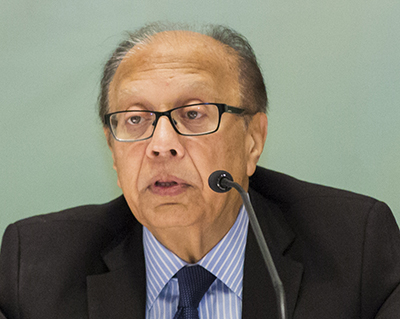


Committed to Sustainable Cities and Human Settlements for All

In Special Consultative Status with ECOSOC
Search
NameDescriptionContent
Home>>Text
Anwarul K. Chowdhury: The Twelfth Global Forum On Human Settlements (GFHS XII)
Source:
|
Author:gfhsforum
|
Published time: 2017-11-22
|
1470 Views
|
Share:

Ambassador Anwarul K. Chowdhury, Chairman of GFHS,
Former UN Under-Secretary-General and High Representative
Former UN Under-Secretary-General and High Representative
In my capacity as the Chairman of the Global Forum on Human Settlements (GFHS), I extend a very warm welcome to all the participants who have joined us from various part of the globe at the Twelfth Global Forum on Human Settlements (GFHS XII) in New York.
In my remarks today I would present a broader perspective of the human settlements agenda in a global setting. Beginning in 2008, for the first time, half of humanity is now living in towns and cities … but this dramatic transition is far from over. We have seen in reality the beginning of a new urban era. It is projected that globally urbanization levels will rise dramatically in the next 35 years to reach 70 percent by 2050. We thus live at a time of unprecedented, rapid, irreversible urbanization.
Urban growth is most rapid in the developing world, where cities gain an average of 5 million residents every month. It has been rightly said that “our struggle for global sustainability will be won or lost in cities. The challenges of rapid urbanization figure prominently in the 2030 Agenda for Sustainable Development in Goal 11 with a commitment to ‘make cities and human settlements inclusive, safe, resilient and sustainable’.”
Cities have the potential to shape the future of humankind and to win the battle for sustainable development. Cities are at the forefront of the global battle against climate change. In the last two decades, cities and urban centres have become the dominant habitats for humankind and the engine-rooms of human development as a whole.
Urbanization offers unprecedented opportunities for increasing living standards, life expectancy and literacy levels, environmental sustainability and more efficient use of increasingly scarce natural resources. For women, urbanization is associated with greater access to employment opportunities, lower fertility levels and increased independence.
At the same time, urban poverty is a severe, pervasive – and largely unacknowledged – feature of modern life. More and more people will end up in the developing world’s growing slums. Securing jobs, shelter, water, electricity, education, health services for all is a daunting task.
Most significantly, a gendered perspective of urban poverty highlights fundamental issues of equality and social justice by showing women’s unequal position in the urban labor market and their greater exposure to violence. I believe that unless women and communities are involved in decision making and policy development at every level of governance, changes to women’s political and socio-economic status will be minimal, and, as a consequence, the improvement of human settlements will be greatly constrained.
“New Urban Agenda” adopted at Habitat III in Quito, Ecuador a year ago, coming on the heels of the adoption of the SDGs seeks to create a mutually reinforcing relationship between urbanization and development. The idea is that these two concepts will become parallel vehicles for sustainable development. The agenda thus seeks to offer guidelines on a range of “enablers” that can further cement the relationship between urbanization and sustainable development.
Beyond the specific technocratic solutions of economics and governance, several core ideas form the ideological underpinnings of the New Urban Agenda. Democratic development and respect for human rights feature prominently, for instance, as does the relationship between the environment and urbanization.
Similarly, the New Urban Agenda includes significant focus on equity in the face of globalization, as well as how to ensure the safety and security of everyone who lives in urban areas, of any gender and age. Risk reduction and urban resilience likewise play prominent roles.
There is also an increasing recognition that cities have morphed into mega-regions, urban corridors and city-regions whose economic, social and political geographies defy traditional conceptions of the “city”.
In recent years, the human rights dimension of human settlements issue, particularly in the context of the right to development, has been highlighted. With the adoption of the Universal Declaration of Human Rights in 1948, the right to adequate housing joined the body of international, universally applicable and universally accepted human rights law. Since that time, this right has been reaffirmed in a wide range of additional human rights instruments, each of which is relevant to distinct groups within society. No less than 12 different texts adopted and proclaimed by the United Nations explicitly recognize the right to adequate housing. Access to drinking water and adequate sanitation facilities are additional basic needs directly associated with the right to housing.
The failure of legal systems to protect homeless and landless people across the world is coupled with a tendency to criminalize them and is part of the trend of increasing violence against the landless and the urban homeless. As has been experienced on many occasions, housing, land and property issues can fuel conflicts and be used as weapons in conflict. Of all the private land in the world, nearly three quarters is estimated to be controlled by just 2.5 per cent of all landowners.
Governments must turn their attention to the needs of vulnerable populations as a matter of urgency as part of their development of effective and comprehensive responses to homelessness. The state of sheer homelessness in the world today along with the immense crisis faced by millions living in inadequate and insecure housing and living conditions, calls for a combination of a humanitarian and a human rights approach.
As globalization expands, more cities will find themselves managing problems and opportunities that used to be the exclusive domain of national governments. And as more cities come to have populations and economies larger than those of many countries, cities will increasingly become the main players in the global economy. If cities are hubs of dynamism, change and opportunity, they are also places of exploitation, disease and unemployment. Crime, drug abuse and pollution have increased in growing numbers of cities. New tensions are emerging between migrants and established residents, adding to already sharp divisions along class, racial and ethnic lines.
Let me conclude by underscoring that sustainable urban development is one of the most pressing challenges facing the human community in the 21st century. As more and more people make cities their home, cities will be the arenas in which some of the world’s biggest social, economic, environmental and political challenges will be faced and need to be addressed collectively. As such, the leadership role of mayors and city governments is of fundamental importance.
It is therefore significant that GFHS has, since its establishment, been focusing on these challenges at each of its annual conferences. This twelfth forum in the series is again another timely, relevant and appropriate initiative that is aimed at making the international community alert and proactive to the issues of urbanization in a holistic manner.
Copyright © Global Forum on Human Settlements (GFHS)
